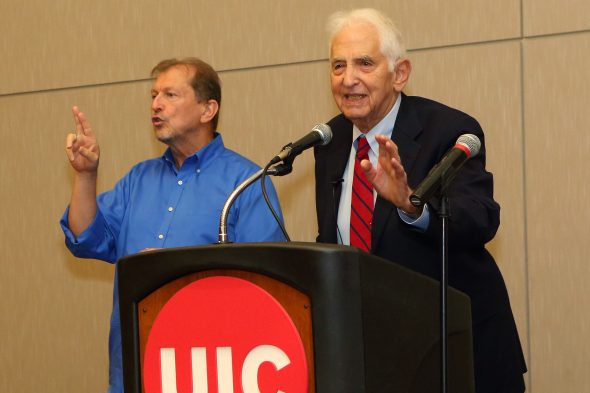Campus Conversation examines US nuclear policy

Daniel Ellsberg, senior fellow of the Nuclear Age Peace Foundation, speaks at the Sept. 4 Campus Conversation event. (Photo: Jenny Fontaine)
Computer programmer Edward Snowden may now be famous for leaking classified U.S. information to the press, but nearly half a century ago, whistleblowing had another name: Daniel Ellsberg.
His intelligence breach made confidential documents called the Pentagon Papers public, showing the world that U.S. government officials lied about the Vietnam War.
On the Sept. 4 kickoff of the Campus Conversation series, sponsored by the Office of the Provost and Vice Chancellor for Academic Affairs, the military strategist shared more secrets. This time, about nuclear weapons.
“The nuclear era is 73 years old,” Ellsberg told a crowd of UIC students, staff and faculty, commenting on the event’s title, “The Past 50 years of Nuclear U.S. Policy.”
“The first thing to say about those figures is American nuclear policy has never really varied,” continued Ellsberg, senior fellow of the Nuclear Age Peace Foundation.
The weaknesses and dangers of the country’s nuclear strategies from the Eisenhower and early Kennedy years still loom, and there’s little public knowledge and understanding of it all, he said.
So, Ellsberg put the strategy’s alarming relevance into perspective, explaining a government plan from the 1960s for conflicts with the Soviet Union. A plan which is still in place today.
“The joint chiefs were estimating that if their plans were used, they would kill 600 million people,” said Ellsberg. “But they were wrong.”
An estimated 1 billion is closer to the actual death count, not including the effects of a Russian retaliation. A nuclear winter could follow, killing almost 99 percent of the human population.
“Smoke and soot from these cities would and will be lofted into the stratosphere, where it doesn’t rain out, and where it quickly goes around the Earth, and, for a decade or more…block out most of the sunlight, raising Ice Age conditions on the Earth,” said Ellsberg.
That’s why he calls the weapons the ‘doomsday machines,’ the partial title of his new book, which he touched on among other things, like corporate profits from production of the weapons; Trump’s relationship with Russia and North Korea’s Kim Jong Un; activist and whistleblower Chelsea Manning, and more.
His final focus, though, tied back to why nuclear weapons should be talked about more widely.
“Humanity will come to grieve from this unless we change course,” Ellsberg told guests. “We still have time do that.”
The next Campus Conversation event, scheduled for Oct. 2, will examine 2018 state and local elections. The event takes place from 12:30 to 2 p.m. in the Illinois Rooms, Student Center East.
